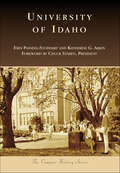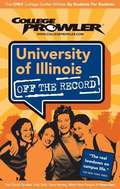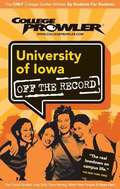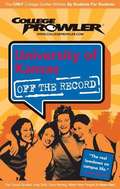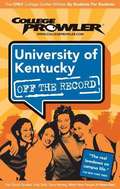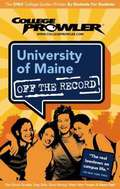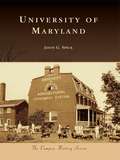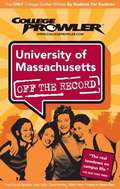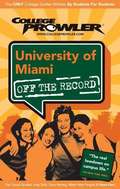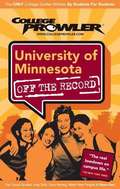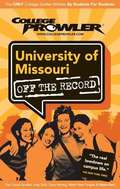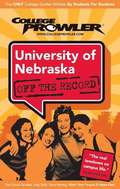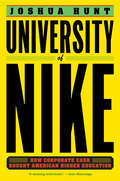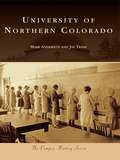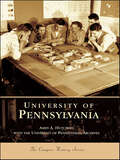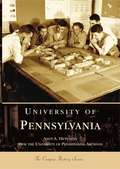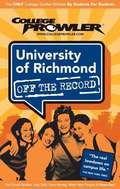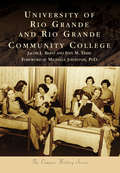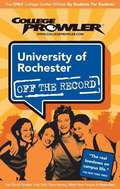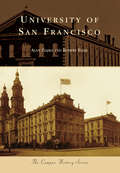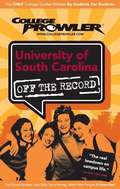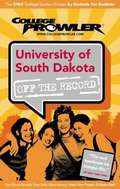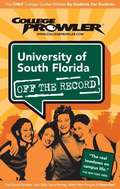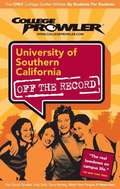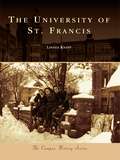- Table View
- List View
University of Idaho (Campus History)
by Erin Passehl-StoddartChroniclers have deemed the University of Idaho "The Beacon for Mountain and Plain" and "This Crested Hill"--both are apt monikers for Idaho's land grant and comprehensive research university. For over 125 years, the University of Idaho has served the people of Idaho, the nation, and the world. Among the institution's more than 100,000 graduates are US senators, members of Congress, and Idaho governors; Olympic gold medalists, professional athletes, and coaches; the country's first Native American astronaut; writers, journalists, and filmmakers; educators; and business and community leaders. Extension offices in 42 of 44 counties and three regional centers bring the University of Idaho to every corner of the state; the institution's economic impact tops $1 billion per year. As the state's first university, the University of Idaho looks to a bright future of serving students and contributing to economic and social progress for Idaho and beyond. This book commemorates the proud heritage and innovative spirit of students, faculty, and staff who have shaped the history of the University of Idaho, featuring images from the library's extensive Special Collections and Archives department.
University of Illinois (College Prowler)
by Bridget SharkeyNo university affiliations. No half-truths. No out-of-touch authors who haven't been in school for decades. A class project turned company, College Prowler produces guidebooks that are written by actual college students and cover the things students really want to know. Unlike other guides that jam everything into a five-pound book and devote only two pages to each college, our single-school guidebooks give students only the schools they want and all the information they need. From academics and diversity to nightlife and sports, we let the students tell it how it is. In addition to editorial reviews and grades for 20 different topics, more than 80 percent of each guide is composed of actual student reviews of their school. Whether readers are looking for "Best and Worst" lists, "Did You Knows?" or traditions, College Prowler guides have it all. Our books are the only place for local slang, urban legends, and tips on the best places to find a date, study, or grab a bite to eat.
University of Iowa (College Prowler)
by Alexander LangNo university affiliations. No half-truths. No out-of-touch authors who haven't been in school for decades. A class project turned company, College Prowler produces guidebooks that are written by actual college students and cover the things students really want to know. Unlike other guides that jam everything into a five-pound book and devote only two pages to each college, our single-school guidebooks give students only the schools they want and all the information they need. From academics and diversity to nightlife and sports, we let the students tell it how it is. In addition to editorial reviews and grades for 20 different topics, more than 80 percent of each guide is composed of actual student reviews of their school. Whether readers are looking for "Best and Worst" lists, "Did You Knows?" or traditions, College Prowler guides have it all. Our books are the only place for local slang, urban legends, and tips on the best places to find a date, study, or grab a bite to eat.
University of Kansas (College Prowler)
by Jonah BallowNo university affiliations. No half-truths. No out-of-touch authors who haven't been in school for decades. A class project turned company, College Prowler produces guidebooks that are written by actual college students and cover the things students really want to know. Unlike other guides that jam everything into a five-pound book and devote only two pages to each college, our single-school guidebooks give students only the schools they want and all the information they need. From academics and diversity to nightlife and sports, we let the students tell it how it is. In addition to editorial reviews and grades for 20 different topics, more than 80 percent of each guide is composed of actual student reviews of their school. Whether readers are looking for "Best and Worst" lists, "Did You Knows?" or traditions, College Prowler guides have it all. Our books are the only place for local slang, urban legends, and tips on the best places to find a date, study, or grab a bite to eat.
University of Kentucky (College Prowler)
by Mandy LangstonNo university affiliations. No half-truths. No out-of-touch authors who haven't been in school for decades. A class project turned company, College Prowler produces guidebooks that are written by actual college students and cover the things students really want to know. Unlike other guides that jam everything into a five-pound book and devote only two pages to each college, our single-school guidebooks give students only the schools they want and all the information they need. From academics and diversity to nightlife and sports, we let the students tell it how it is. In addition to editorial reviews and grades for 20 different topics, more than 80 percent of each guide is composed of actual student reviews of their school. Whether readers are looking for "Best and Worst" lists, "Did You Knows?" or traditions, College Prowler guides have it all. Our books are the only place for local slang, urban legends, and tips on the best places to find a date, study, or grab a bite to eat.
University of Maine (College Prowler)
by Justin M. WozniskiNo university affiliations. No half-truths. No out-of-touch authors who haven't been in school for decades. A class project turned company, College Prowler produces guidebooks that are written by actual college students and cover the things students really want to know. Unlike other guides that jam everything into a five-pound book and devote only two pages to each college, our single-school guidebooks give students only the schools they want and all the information they need. From academics and diversity to nightlife and sports, we let the students tell it how it is. In addition to editorial reviews and grades for 20 different topics, more than 80 percent of each guide is composed of actual student reviews of their school. Whether readers are looking for "Best and Worst" lists, "Did You Knows?" or traditions, College Prowler guides have it all. Our books are the only place for local slang, urban legends, and tips on the best places to find a date, study, or grab a bite to eat.
University of Maryland (Campus History)
by Jason G. SpeckOn March 6, 1856, the State of Maryland granted a charter for the creation of Maryland Agricultural College. Opening its doors to 34 eager young men in 1859, the college survived a disastrous fire in 1912 to become the University of Maryland in 1920. Today the school is a top-ranked, public research land-grant university with over 100 undergraduate majors, 120 graduate programs, and 35,000 students. Campus History Series: University of Maryland honors the history of the university and all who have contributed to its progress: faculty, staff, students, and alumni. From its earliest years, their labors and love for the institution have led to the creation of an intellectually vibrant and culturally diverse university that serves proudly as the flagship campus of the University System of Maryland. Images from the University of Maryland Archives and other campus sources, many never before published, illustrate the University of Maryland's rise from a "cow college" to an internationally recognized academic, artistic, and athletic powerhouse in the 21st century.
University of Massachusetts (College Prowler)
by Seth N. PouliotNo university affiliations. No half-truths. No out-of-touch authors who haven't been in school for decades. A class project turned company, College Prowler produces guidebooks that are written by actual college students and cover the things students really want to know. Unlike other guides that jam everything into a five-pound book and devote only two pages to each college, our single-school guidebooks give students only the schools they want and all the information they need. From academics and diversity to nightlife and sports, we let the students tell it how it is. In addition to editorial reviews and grades for 20 different topics, more than 80 percent of each guide is composed of actual student reviews of their school. Whether readers are looking for "Best and Worst" lists, "Did You Knows?" or traditions, College Prowler guides have it all. Our books are the only place for local slang, urban legends, and tips on the best places to find a date, study, or grab a bite to eat.
University of Michigan (College Prowler)
by Michael HondorpNo university affiliations. No half-truths. No out-of-touch authors who haven't been in school for decades. A class project turned company, College Prowler produces guidebooks that are written by actual college students and cover the things students really want to know. Unlike other guides that jam everything into a five-pound book and devote only two pages to each college, our single-school guidebooks give students only the schools they want and all the information they need. From academics and diversity to nightlife and sports, we let the students tell it how it is. In addition to editorial reviews and grades for 20 different topics, more than 80 percent of each guide is composed of actual student reviews of their school. Whether readers are looking for "Best and Worst" lists, "Did You Knows?" or traditions, College Prowler guides have it all. Our books are the only place for local slang, urban legends, and tips on the best places to find a date, study, or grab a bite to eat.
University of Minnesota (College Prowler)
by Amy S. PalmerNo university affiliations. No half-truths. No out-of-touch authors who haven't been in school for decades. A class project turned company, College Prowler produces guidebooks that are written by actual college students and cover the things students really want to know. Unlike other guides that jam everything into a five-pound book and devote only two pages to each college, our single-school guidebooks give students only the schools they want and all the information they need. From academics and diversity to nightlife and sports, we let the students tell it how it is. In addition to editorial reviews and grades for 20 different topics, more than 80 percent of each guide is composed of actual student reviews of their school. Whether readers are looking for "Best and Worst" lists, "Did You Knows?" or traditions, College Prowler guides have it all. Our books are the only place for local slang, urban legends, and tips on the best places to find a date, study, or grab a bite to eat.
University of Missouri (College Prowler)
by Jason A. RosenbaumNo university affiliations. No half-truths. No out-of-touch authors who haven't been in school for decades. A class project turned company, College Prowler produces guidebooks that are written by actual college students and cover the things students really want to know. Unlike other guides that jam everything into a five-pound book and devote only two pages to each college, our single-school guidebooks give students only the schools they want and all the information they need. From academics and diversity to nightlife and sports, we let the students tell it how it is. In addition to editorial reviews and grades for 20 different topics, more than 80 percent of each guide is composed of actual student reviews of their school. Whether readers are looking for "Best and Worst" lists, "Did You Knows?" or traditions, College Prowler guides have it all. Our books are the only place for local slang, urban legends, and tips on the best places to find a date, study, or grab a bite to eat.
University of Nebraska (College Prowler)
by Aaron EskeNo university affiliations. No half-truths. No out-of-touch authors who haven't been in school for decades. A class project turned company, College Prowler produces guide books that are written by actual college students and cover the things students really want to know. Unlike other guides that jam everything into a five-pound book and devote only two pages to each college, our single-school guide books give students only the schools they want and all the information they need. From academics and diversity to nightlife and sports, we let the students tell it how it is. In addition to editorial reviews and grades for 20 different topics, more than 80 percent of each guide is composed of actual student reviews of their school. Whether readers are looking for "Best and Worst" lists, "Did You Knows?" or traditions, College Prowler guides have it all. Our books are the only place for local slang, urban legends, and tips on the best places to find a date, study, or grab a bite to eat.
University of Nike: How Corporate Cash Bought American Higher Education
by Joshua HuntThe dramatic expose of how the University of Oregon sold its soul to Nike, and what that means for the future of our public institutions and our society. In the mid-1990s, facing severe cuts to its public funding, the University of Oregon—like so many colleges across the country—was desperate for cash. Luckily, the Oregon Ducks’ 1995 Rose Bowl berth caught the attention of the school’s wealthiest alumnus: Nike founder Phil Knight, who was seeking new marketing angles at the collegiate level. And so the University of Nike was born: Knight has so far donated more than half a billion dollars to the school in exchange for high-visibility branding opportunities. But as journalist Joshua Hunt shows in University of Nike, Oregon has paid dearly for the veneer of financial prosperity and athletic success that has come with this brand partnering. Hunt uncovers efforts to conceal university records, buried sexual assault allegations against university athletes, and cases of corporate overreach into academics and campus life—all revealing a university being run like a business, with America’s favorite “Shoe Dog” calling the shots. Nike money has shaped everything from Pac-10 television deals to the way the game is played, from the landscape of the campus to the type of student the university hopes to attract.More alarming still, Hunt finds other schools taking a page from Oregon’s playbook. Never before have our public institutions for research and higher learning been so thoroughly and openly under the sway of private interests, and never before has the blueprint for funding American higher education been more fraught with ethical, legal, and academic dilemmas. Encompassing more than just sports and the academy, University of Nike is a riveting story of our times.
University of Northern Colorado
by Mark Anderson Jay TraskThe University of Northern Colorado began in 1889 as the Colorado State Normal School, an institution dedicated to training the state's teachers. Over the next century the institution grew from a relatively small normal school into an acclaimed state university with several nationally recognized graduate and undergraduate programs. During this period of transformation, the Greeley school experienced several name changes. It was renamed the State Teachers College of Colorado in 1911, followed by the Colorado State College of Education in 1935, then simply the Colorado State College in 1957, and finally, the University of Northern Colorado (UNC) in 1970, in recognition of the institution's broadened mission. UNC's first 100 years saw dramatic changes to the physical and academic environments on campus, including advancements in the fields of education, health, music, theater arts, and human sciences.
University of Pennsylvania
by University of Pennsylvania ArchivesBy the time photography was invented in the 1830s, the University of Pennsylvania, America's first university, was nearly a century old. University of Pennsylvania, a unique photographic collection, focuses on the school's history at its present campus in West Philadelphia beginning shortly after the end of the Civil War and provides images of more than a century of student life inside and outside the classroom. In every category, from campus landmarks to the student body to the traditions that bind the community together, these photographs demonstrate the close connections between Penn's present and its past. They also reveal historical aspects of the Penn experience that have since vanished.
University of Pennsylvania (The Campus History Series)
by Amey A. HutchingsBy the time photography was invented in the 1830s, the University of Pennsylvania, America's first university, was nearly a century old. University of Pennsylvania, a unique photographic collection, focuses on the school's history at its present campus in West Philadelphia beginning shortly after the end of the Civil War and provides images of more than a century of student life inside and outside the classroom. In every category, from campus landmarks to the student body to the traditions that bind the community together, these photographs demonstrate the close connections between Penn's present and its past. They also reveal historical aspects of the Penn experience that have since vanished.
University of Richmond (College Prowler)
by Peter K. HansenNo university affiliations. No half-truths. No out-of-touch authors who haven't been in school for decades. A class project turned company, College Prowler produces guidebooks that are written by actual college students and cover the things students really want to know. Unlike other guides that jam everything into a five-pound book and devote only two pages to each college, our single-school guidebooks give students only the schools they want and all the information they need. From academics and diversity to nightlife and sports, we let the students tell it how it is. In addition to editorial reviews and grades for 20 different topics, more than 80 percent of each guide is composed of actual student reviews of their school. Whether readers are looking for "Best and Worst" lists, "Did You Knows?" or traditions, College Prowler guides have it all. Our books are the only place for local slang, urban legends, and tips on the best places to find a date, study, or grab a bite to eat.
University of Rio Grande and Rio Grande Community College (Campus History)
by Phd Ivan M. Tribe Jacob L. Bapst Foreword By JohnstonOn September 13, 1876, the bell on Atwood Hall rang, students assembled, and Rio Grande College began its 140-year search for identity and its struggle for existence. Ira Haning, a Freewill Baptist minister, conveyed the idea of a college to a prominent couple, Nehemiah and Permelia Atwood. Nehemiah passed away in 1869, and supposedly, his last words were “Permelia, build the college.” Permelia deeded 10 acres and financed Atwood Hall and the Boarding Hall, and Rio Grande College became a reality. Upon Permelia’s death in 1885, Rio Grande faced the first of many financial pitfalls. Her estate was willed to the college, but the heirs of her second husband contested it in an action that would be resolved by the Ohio Supreme Court in 1896. As a college, junior college, community college, and currently, as a university, Rio Grande continues to seek a definitive identity.
University of Rochester (College Prowler)
by Kerri LindenNo university affiliations. No half-truths. No out-of-touch authors who haven't been in school for decades. A class project turned company, College Prowler produces guidebooks that are written by actual college students and cover the things students really want to know. Unlike other guides that jam everything into a five-pound book and devote only two pages to each college, our single-school guidebooks give students only the schools they want and all the information they need. From academics and diversity to nightlife and sports, we let the students tell it how it is. In addition to editorial reviews and grades for 20 different topics, more than 80 percent of each guide is composed of actual student reviews of their school. Whether readers are looking for "Best and Worst" lists, "Did You Knows?" or traditions, College Prowler guides have it all. Our books are the only place for local slang, urban legends, and tips on the best places to find a date, study, or grab a bite to eat.
University of San Francisco
by Robert Elias Alan ZiajkaThe University of San Francisco began in 1855 as a one-room schoolhouse named St. Ignatius Academy. Its founding is interwoven with the establishment of the Jesuit Order in California, European immigration to the western United States, and the population growth of California and San Francisco as a result of the California Gold Rush. For 159 years, the University of San Francisco has enriched the lives of thousands of people. The institution has graduated students who went on to become leaders in government, education, business, journalism, sports, the sciences, and the legal and medical professions. Among its alumni, the university counts three San Francisco mayors, a US senator, four California Supreme Court justices, a California lieutenant governor, two Pulitzer Prize winners, three Olympic medalists, several professional athletes, and the former president of Peru.
University of South Carolina (College Prowler)
by Jessica FosterNo university affiliations. No half-truths. No out-of-touch authors who haven't been in school for decades. A class project turned company, College Prowler produces guidebooks that are written by actual college students and cover the things students really want to know. Unlike other guides that jam everything into a five-pound book and devote only two pages to each college, our single-school guidebooks give students only the schools they want and all the information they need. From academics and diversity to nightlife and sports, we let the students tell it how it is. In addition to editorial reviews and grades for 20 different topics, more than 80 percent of each guide is composed of actual student reviews of their school. Whether readers are looking for "Best and Worst" lists, "Did You Knows?" or traditions, College Prowler guides have it all. Our books are the only place for local slang, urban legends, and tips on the best places to find a date, study, or grab a bite to eat.
University of South Dakota (College Prowler)
by Kerry HaceckyNo university affiliations. No half-truths. No out-of-touch authors who haven't been in school for decades. A class project turned company, College Prowler produces guidebooks that are written by actual college students and cover the things students really want to know. Unlike other guides that jam everything into a five-pound book and devote only two pages to each college, our single-school guidebooks give students only the schools they want and all the information they need. From academics and diversity to nightlife and sports, we let the students tell it how it is. In addition to editorial reviews and grades for 20 different topics, more than 80 percent of each guide is composed of actual student reviews of their school. Whether readers are looking for "Best and Worst" lists, "Did You Knows?" or traditions, College Prowler guides have it all. Our books are the only place for local slang, urban legends, and tips on the best places to find a date, study, or grab a bite to eat.
University of South Florida (College Prowler)
by Whitney MeersNo university affiliations. No half-truths. No out-of-touch authors who haven't been in school for decades. A class project turned company, College Prowler produces guidebooks that are written by actual college students and cover the things students really want to know. Unlike other guides that jam everything into a five-pound book and devote only two pages to each college, our single-school guidebooks give students only the schools they want and all the information they need. From academics and diversity to nightlife and sports, we let the students tell it how it is. In addition to editorial reviews and grades for 20 different topics, more than 80 percent of each guide is composed of actual student reviews of their school. Whether readers are looking for "Best and Worst" lists, "Did You Knows?" or traditions, College Prowler guides have it all. Our books are the only place for local slang, urban legends, and tips on the best places to find a date, study, or grab a bite to eat.
University of Southern California (College Prowler)
by Alex ValhouliNo university affiliations. No half-truths. No out-of-touch authors who haven't been in school for decades. A class project turned company, College Prowler produces guidebooks that are written by actual college students and cover the things students really want to know. Unlike other guides that jam everything into a five-pound book and devote only two pages to each college, our single-school guidebooks give students only the schools they want and all the information they need. From academics and diversity to nightlife and sports, we let the students tell it how it is. In addition to editorial reviews and grades for 20 different topics, more than 80 percent of each guide is composed of actual student reviews of their school. Whether readers are looking for "Best and Worst" lists, "Did You Knows?" or traditions, College Prowler guides have it all. Our books are the only place for local slang, urban legends, and tips on the best places to find a date, study, or grab a bite to eat.
University of St. Francis (Campus History)
by Linnea KnappThe story of the University of St. Francis began in 1920 when the seeds were planted for Assisi Junior College. The school's evolution continued when, as the College of St. Francis, it awarded bachelor's degrees in 1930, became coeducational in 1970, and attained university status in 1998. The university owes its existence to the Congregation of the Sisters of St. Francis of Mary Immaculate, founded by Mother Alfred Moes in 1865, with Mother Thomasine Fryewska serving as the first president of the institution. Currently this vibrant community claims over 3,500 students on the main campus in Joliet, the many off-campus sites, and online. Throughout the years, the school has grown, adding buildings, programs, and students, but has remained rooted in its Franciscan identity of respect, service, integrity, and compassion.
